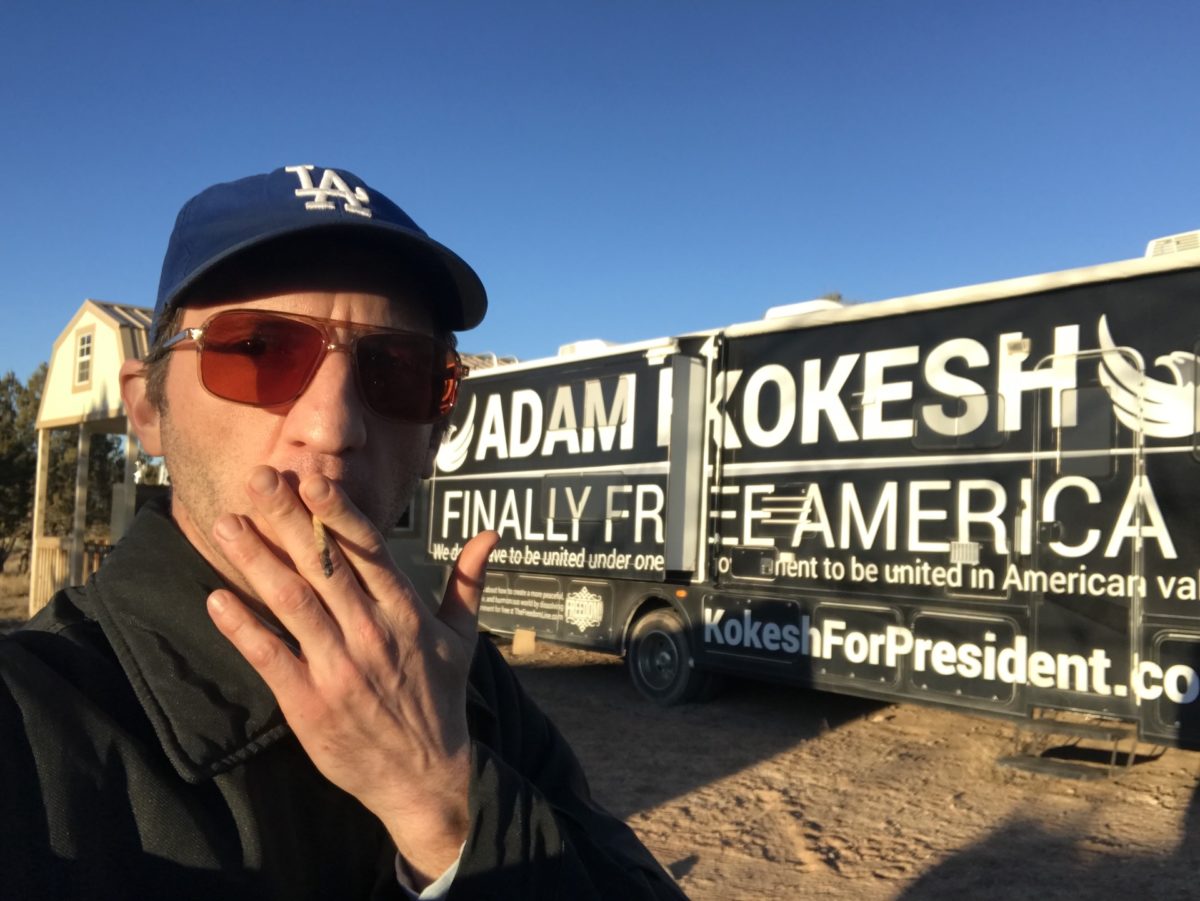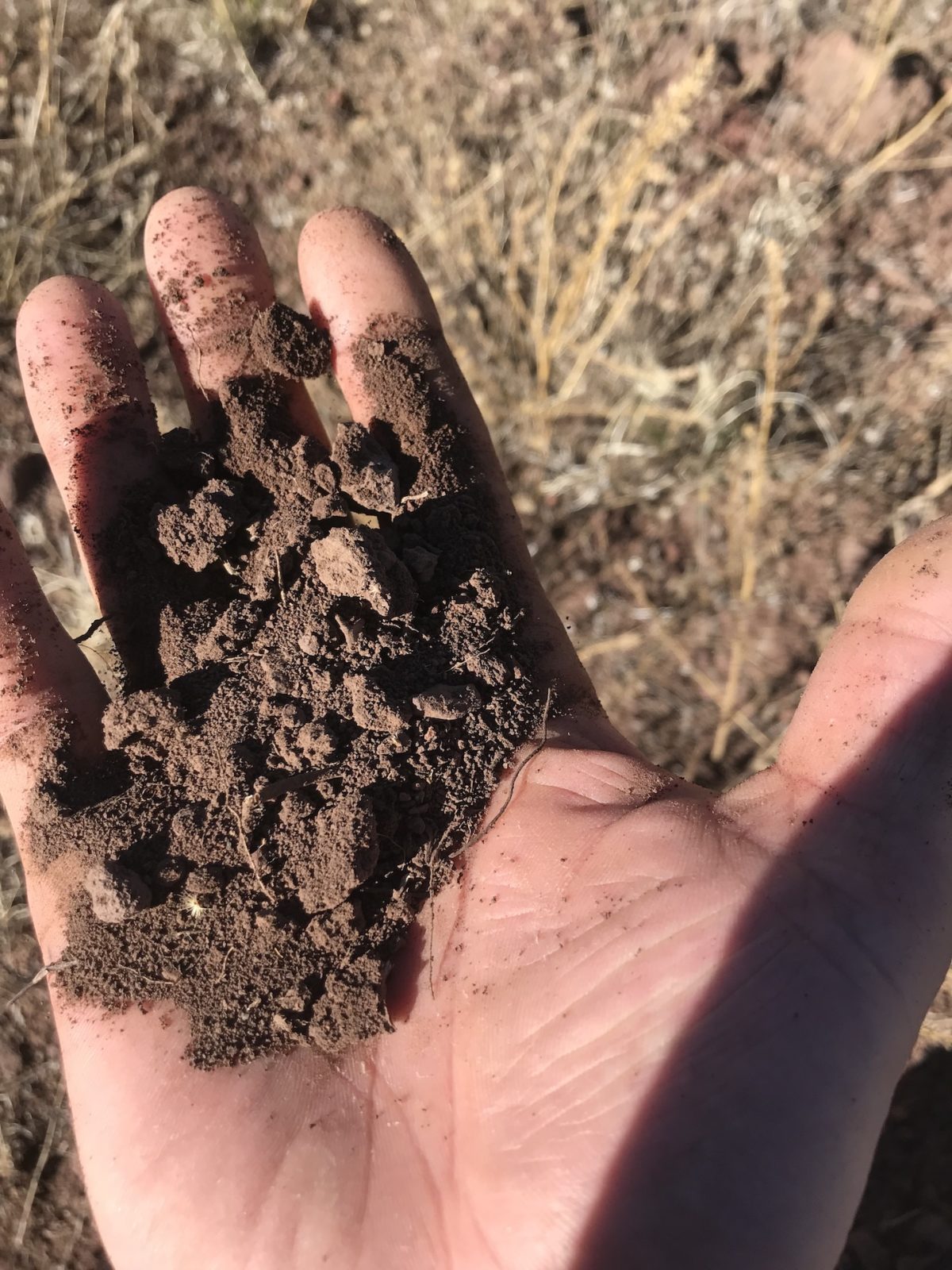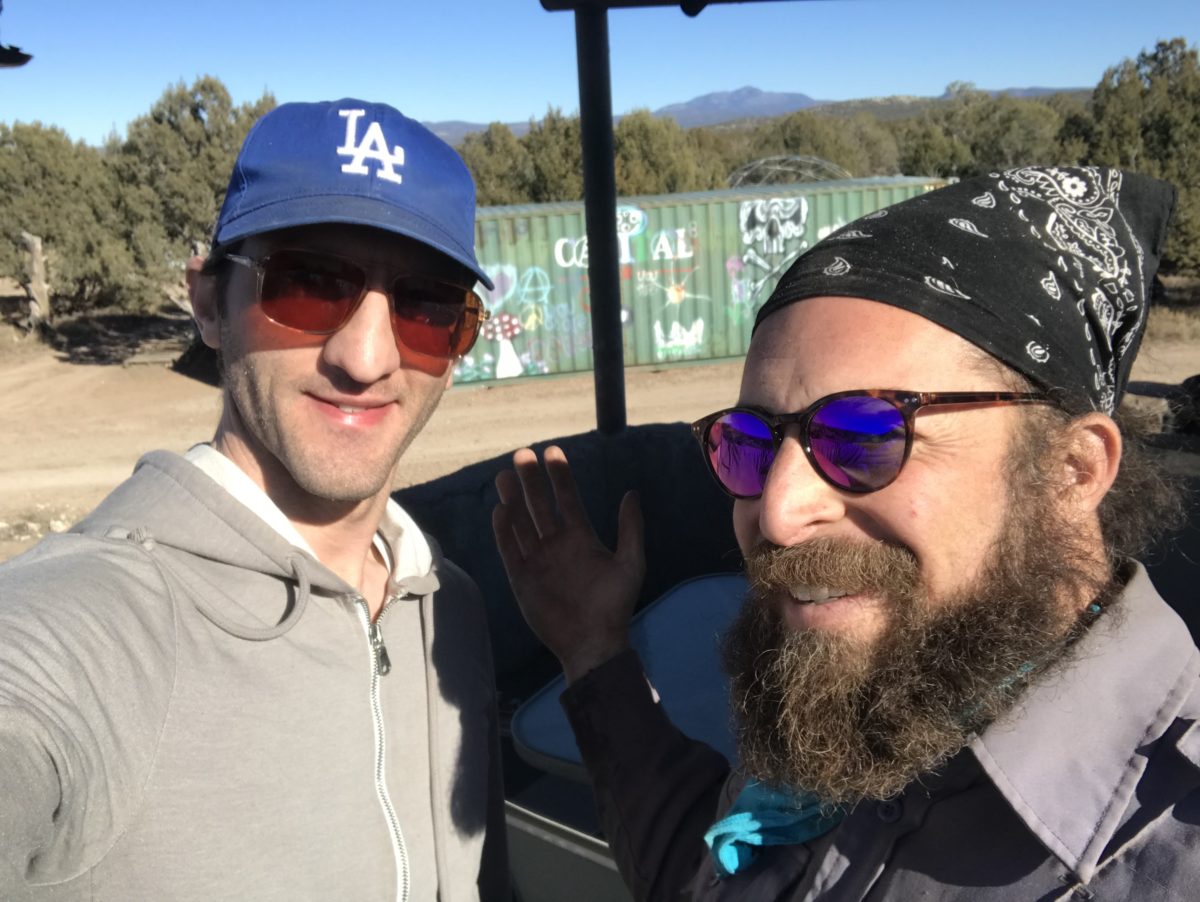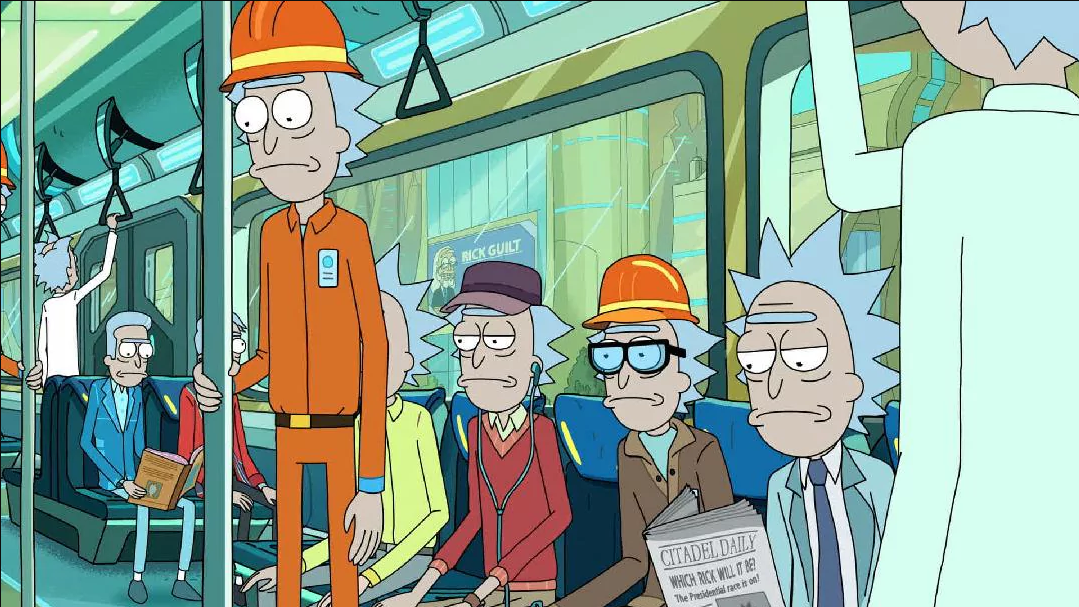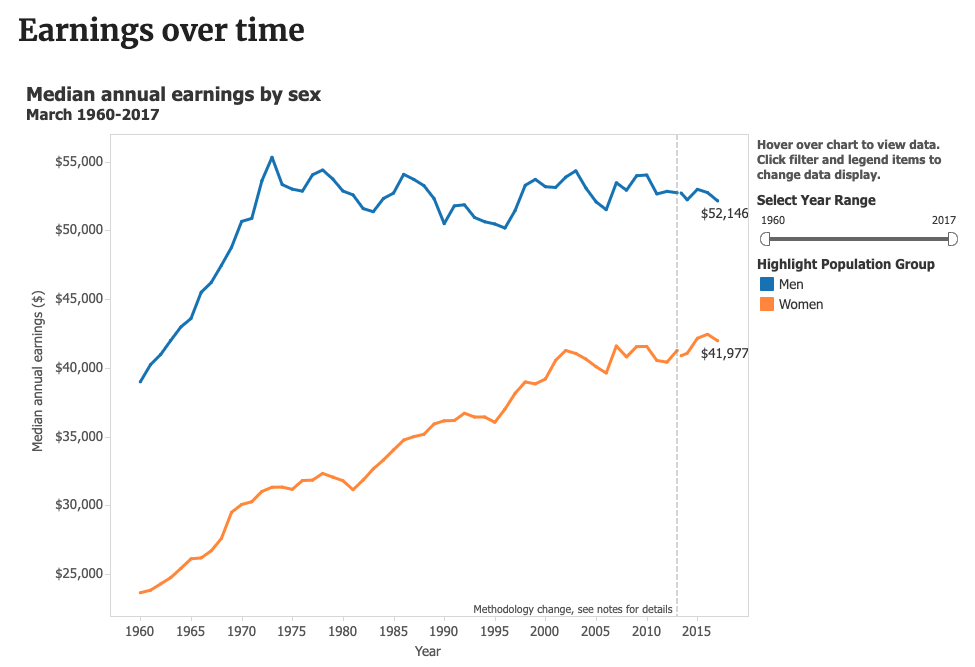We have all heard this notion that anyone who actually wants to be President of the United States has to be insane, and therefore unfit for office. I believe most people agree with that.
So what if that candidate’s platform is to dissolve the federal government? Which candidate is crazier, the one that wants the job or the one that wants to make the job go away?
This is Adam Kokesh. He is a bona fide madman, but I would trust him with power because he doesn’t want it, and ran for President in 2020 with the Libertarian Party on this platform.
Whether or not I agree with his position to destroy all federal power, we share the same anarchistic ethos.
Kokesh calls himself a voluntaryist. Personally, I relate, as I have always considered volunteering an important part of my life. Ten years ago, I had no space in life for a job because everything I did was volunteered. I still basically live that way, but I make money.
The Libertarian Party is no less statist than the Green Party, when it comes down to it. Can you call yourself an anarchist and be involved with a political party? I certainly think you can tolerate political parties, as it is not your responsibility to ban them. I just don’t see how it works the other way around.
The characters attracted to and involved with Libertarianism have always varied from anti-federalists like Kokesh to corporatist millionaires simply out to protect their wealth by leveraging federal power to skirt regulations that actually protect communities and individual rights. The resulting policy platform becomes, like the Green Party, off-center but far from any radical change.
Adam Versus The Man was a very big YouTube show. Kokesh sat down with Joe Rogan in the early years of his podcast. Adam is a combat veteran that became an anti-war activist, but I haven’t frankly researched much further than our direct contact.
Today, he is damn near cancelled. Last week, he was beefing with Spotify and Rogan for removing his episode from the platform, even though the JRE video is up on his own YouTube page. His Twitter profile remains intact, and that is how we got in touch.
Marcus from Aquarian Anarchy podcast was his press secretary during the campaign. I was on that podcast in January, and before that, two of the hosts were on my own livestream. Maybe that is why Adam’s girlfriend The Commander in Kief followed me back on Twitter.
Shortly after that, Kokesh was arrested for possession of federally regulated drugs, in Saguache County, Colorado, even though they have been legalized in Denver County. His core supporters mobilized to get him out, launching the hashtag #FreeKokesh.
Kief began showing pictures of her relationship with Adam. This was a clear PR move, but whatever, that’s how I learned they were connected. I followed him and he followed back.
The chargers against him were eventually dismissed, due probably to his purposeful lack of cooperation, and public support.
I contacted Kief, saying that I’d like to visit their compound in Ash Fork, Arizona. I make the annual trip to visit family in Tucson, but this was an extra destination.
I am about to make a life-changing transition from urban to country, I am considering leaving Pennsylvania to come back out west. Alternatively, I could try for two properties — this really is a dream to own at least two places where I love to be.
When I arrived in Phoenix early Friday morning, I picked up my rental car and made my way north to Ash Fork. I cruised around the region to scope out some parcels.
Much of the area is just not acceptable for my needs, from topography to land values. Pretty much, the sweet spot is Ash Fork. I know a good investment when I see it.
The town is dilapidated and scary, on an irrelevant stretch of Route 66. The motels look dangerous, there is very little commerce. All of this spells opportunity to me.
Adam assured me that if I texted him, he’d be available. That’s why I got nervous when he didn’t answer. After a few hours, I figured I might as well walk about the main street and get to know the community by sitting in a bar.
The Oasis Lounge lured me like a mirage on the sand.
I walked in, immediately I was invited into the community. I met an engineer and builder couple with seven children who had given up their careers for a free lifestyle. They worked in the Portland area the last year I lived there. They bought me a round. Their daughter was the bartender, aged 19 and still wearing braces. The regulars ambled about like it was their living room.
That’s when I got the text back from Kokesh. I invited him down for a beer, he accepted, as he was on his way to the Family Dollar down the street.
When Adam walked through the door, it was obvious, with his wild hair and beard, the ill-fitting work clothes, and the intensity of his gaze. I jumped up from my stool, extending my handshake to say, “Mr. Kokesh!”
“Hey! Sean…” he replied.
“Nice to meet you, glad you made it — have a seat!” showing him the beer selection.
“I’m sorry man, I forgot you were coming. I’m a dick.” He conceded.
Shrugging it off, just happy I wasn’t stood up, I said, “It’s all good.”
“I’m on mushrooms too.” He wanted me to know.
Sadly that was the end of his stash. I had my hopes set to shroom that night.
He already wanted to know what my plans for Ash Fork were, looking to see whether or not I had some role to play in his community. I told him I still needed to feel it out.
He downed his cider and we boogied, following him home through miles of unpaved road. He wanted to work alone until sunset, so I walked about the perimeter, hung out with the dogs, Thelma and Louise.
The compound is powered by wind, solar, and locally harvested wood. Structures made from natural, recycled, and reusable materials are scattered over ten acres.
Adam is 40 years old and I am 39. We are both fixed on starting families, supporting them with self-sufficient properties, and a community of creative freedom-oriented people.
After finishing his work, he set up my bunk in the sound studio. There was a plaque on the wall from YouTube representing his achievement of acquiring more than 100K subscribers, around a decade ago. I asked him, “Has YouTube cancelled you yet?”
“Oh Yeah,” he replied.
He cannot post new content, although there are 263K subscribers to his channel today.
“Too bad you don’t get a trophy for being cancelled too,” I said.
“Yeah they should,” he said, laughing.
We retired to his cabin and proceeded to drink his rum and fruit juice concoction. He offered me food, but I declined, as my metabolism had already settled on booze that afternoon at the Oasis. You can feel it when that happens. We smoked.
We argued about government.
My argument is that we are not culturally prepared for that level of responsibility. The federal government might be the necessary component to maintain liberties across the fifty states.
“You’re familiar enough with my body of work that I don’t have to explain…” Feeling out my level of fandom.
I interrupted him, “No, I’m not!”
I had only heard his one appearance on Aquarian Anarchy, after his candidacy was over. I told him exactly what I thought about him then, I literally just thought, “I could hang out with this guy.” It was never my ambition to do so. It kind of just happened.
Adam’s position is that the federal government can be eliminated in relatively short order. All programs can be carried out by the states. This means each state would become an independent nation.
He called me out as ADD because I was, at that point, impatiently jumping in a lot. He demanded that I articulate my purpose and vision for my life. Every moment was friendly and good natured, but challenging. Friends should challenge each other like this, without accompanying judgement.
“I see your skills. I see your potential,” but he was trying to discover if there was some reason that I was in his life suddenly, as we were truly strangers getting drunk together in his house.
I came to the conclusion that my vision and purpose has been clear to me for many years. The problem at this point is confidence.
“The fact that I am here with you right now is an expression of my purpose,” I insisted.
“I am so grateful and excited about twenty more years of hardcore work ahead of me,” explaining that I blew my purpose-driven life once already by letting insecurities hold the wheel.
I started feeling emotional, carrying on that He and I were in the upper percentile of people that even try to follow their purpose and vision outside of what is prescribed for them by institutions. I began tearing up because I know from experience how most people give up before they even start, driven by fear, doubt, and insecurities, and those who pursue their vision without handling those issues, like myself, inevitably crash and burn, or they burn everyone around them to maintain control.
Conversation had crescendo’d. He ushered me to my bunk. “Thank You for your hospitality,” I said, ready to sleep off the red eye flight.
It was eight degrees when I woke up, but I was wearing a T-shirt and jeans by the afternoon. Immediately east of Ash Fork toward Flagstaff, it becomes forested desert, ski lodges and tourism, while immediately west, you’re back in pure desert.
My purpose, in the morning, was breakfast, for which I drove thirty miles to the nearest diner. It was a good opportunity to ruminate on our talk.
The truth is that I continue to struggle with the idea of individual purpose. I don’t believe anyone’s purpose is fixed. For example, I believe my technical purpose in life is to produce media and music, however, the real purpose behind that is to connect people into community, to open consciousness. This has always been the effect of my most successful projects.
Everyone’s God-given purpose connects along the same principles, regardless of how specific you get into someone’s individual situation, because our realm truly operates on base principles.
When I got back, ready to work, I found Adam cutting lower limbs off trees. I was smoking a joint. He said, “Hey! You should know I dropped two tabs of acid. Do you want one?”
I cracked up, “No!” I worried about driving home. That, and I never really lifted my personal rule to only do naturally growing drugs.
He asked, “What do you want to do with your day, man?”
“I told you I would put in some work and I’m going to do that,” reassuring him.
We grabbed some gloves, a rake, and loppers, to go about clearing area for camping. I volunteered to rake the tumbleweed.
He went back to his work and I went to mine. I sought the martial arts in the work. Pulling the rake by leveraging my body weight, I was able to reduce the stress on my body and clear a big area in a fairly short time.
“Thanks for you work, man, it’s already looking great,” he said.
“You’re welcome. I’m here to learn about this land, to discover what it means to manage this kind of property,” I said. I mean it truly, you have to feel it before investing.
“I’m glad you see it that way,” he said.
His neighbors came over and they continued the tasks just about when I had to go.
Now I wished I had taken the acid. I realized, there was a headspace that I should have shared with this guy, to fully embrace my visit. I’m a psychonaut too! I really had enough time to peak, come down, and drive. I know I can handle my psyche. I am not afraid of it. One tab was not going to make me nuts. Truly, the universe was trying to say that it was time to try acid.
When I got home and he retweeted our selfie, that’s when I realized how much this guy means to people, how legendary he is to so many. I was like, “Oh damn, he’s huge!” I don’t care if someone is famous or rich or whatever, so long as they are genuine people who live well.
This, Adam is, for sure. He is a balanced man with masculine energy, a fighter, that is also concerned with beauty, love and truth, applying artistic creativity to his property, bringing a range of open-minded people together in community for the purpose of mutual empowerment. He generously offers of himself and wants the same.
The best has yet to come, for both of us. He’s coming to a place where I believe if he runs again, he’ll be much more prepared, not just for the fact that he owns the tour bus and stuff like that, but because he is growing as a man. He was only 38 in his candidacy.
The only problem I see in his message breaking through is his image. Not his personality, but for how the media will characterize him. How to get ahead of that is pretty darn hard, except, he hides nothing. The currency of the corrupt is secrecy. I don’t know if he has a secret.
I see an absurdly transparent man, building his property out, preparing for a family. I could see him semi-retired from the public eye to enjoy the fruits of his labor, but the problem with that is, his purpose might be tied to public life. I am not sure if he can resist it.
I know I cannot.
